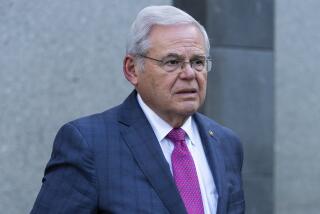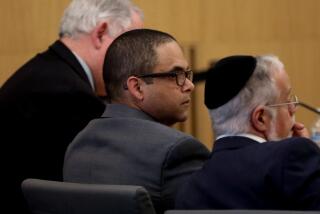After 1st Day, Killen Jury Is Deadlocked
- Share via
PHILADELPHIA, Miss. — Jurors in the trial of Edgar Ray Killen, who is accused of murdering three civil rights workers in 1964, reported at the end of their first day of deliberations that they were split by a vote of 6 to 6.
The announcement disappointed those who had hoped for a quick conviction in one of the most notorious crimes of the civil rights era. Killen, a Baptist preacher and Ku Klux Klan member, is accused of organizing the mob that killed Michael H. Schwerner, James E. Chaney and Andrew Goodman.
“It’s like the breath being knocked out of me to hear 6 to 6,” said Fenton DeWeese, a local attorney and a member of the Philadelphia Coalition, which had pushed for reopening the case. “Shock. There’s no other way to describe it.”
But defense lawyer James D. McIntyre smiled broadly. “We’re pleased,” he said, adding that a hung jury “would be a victory.”
In closing arguments Monday, the prosecution and defense reprised themes that had been heard in this town for decades.
His voice trembling slightly at times, Dist. Atty. Mark Duncan told jurors they had the power to rewrite the story of Neshoba County’s darkest and most violent episode, the slayings dramatized in the film “Mississippi Burning.”
“What you do in life echoes in eternity,” he said. “What you do in life when you go into the jury room is going to echo in Neshoba County forever. You can either change the history that Edgar Ray Killen and his friends wrote for Neshoba County, or you can confirm it.”
Killen, 80, who broke both legs in a March logging accident, sat impassively in his wheelchair and dozed occasionally. At one point in his closing statement, Mississippi Atty. Gen. Jim Hood turned and pointed at Killen.
“That coward is still sitting right here in the courtroom,” Hood said. “That venom is right here. It’s seething behind those glasses.”
Killen’s attorneys argued that prosecutors had offered little testimony linking him to the killings, leaning on evidence from a 1967 federal conspiracy trial.
McIntyre accused prosecutors of stirring up racial hatred for political reasons.
“This has done nothing but agitate the state of Mississippi,” McIntyre said. He said reopening the case might help the victims’ families, but that “when justice is done, they’ll go back to New York or Oregon or wherever they’re from.”
The slayings of Schwerner, Chaney and Goodman -- who were registering black voters -- helped to galvanize the civil rights movement. The three men had been investigating a fire that destroyed the original Mt. Zion United Methodist Church when they were arrested for speeding on June 21, 1964. When they were released from jail, their station wagon was followed by Klansmen who beat and shot the men on a deserted country road.
The state never brought murder charges in the case. Seven men were convicted on federal conspiracy charges in 1967; Killen was not among them.
The defense called its final witnesses Monday, including Philadelphia’s former mayor, who testified that he had seen Killen at a funeral home on the night of the killings. When asked about Killen’s membership in the Klan, Harlan Majure said: “I know some about the Ku Klux Klan that most people don’t know. They did a lot of good too. As far as I know, they’re a peaceful organization.”
After the jury left for deliberations, the courtroom fell quiet. Killen sat beside his wife. Rita Schwerner Bender, Michael Schwerner’s widow, gazed across the room and fiddled with her wedding ring. In the back of the room, Leroy Clemons couldn’t keep his foot from tapping.
“I knew it wouldn’t be about the prosecution or the defense. I knew it was going to come down to those people in those chairs, and that’s scary,” said Clemons, 43, an executive at a nearby resort complex and a member of the Philadelphia Coalition.
“You see how I’m tapping and shaking?” he said. “Actually, I feel like I’m on trial here. My state, my town.”
Andrew Sheldon, an Atlanta jury consultant who has assisted prosecutors in several reopened civil rights cases, said the panel had reported a “hard split,” presumably between those voting for conviction and those voting for acquittal.
Some also could be arguing for a manslaughter conviction, which prosecutors offered as an alternative to a murder conviction.
After announcing that deliberations had ended for the day, Circuit Court Judge Marcus Gordon sent the jurors -- seven women and five men, nine white and three black -- back to the hotel where they were sequestered. Deliberations were to resume this morning.
*
Times researcher Lianne Hart contributed to this report.
More to Read
Sign up for Essential California
The most important California stories and recommendations in your inbox every morning.
You may occasionally receive promotional content from the Los Angeles Times.










